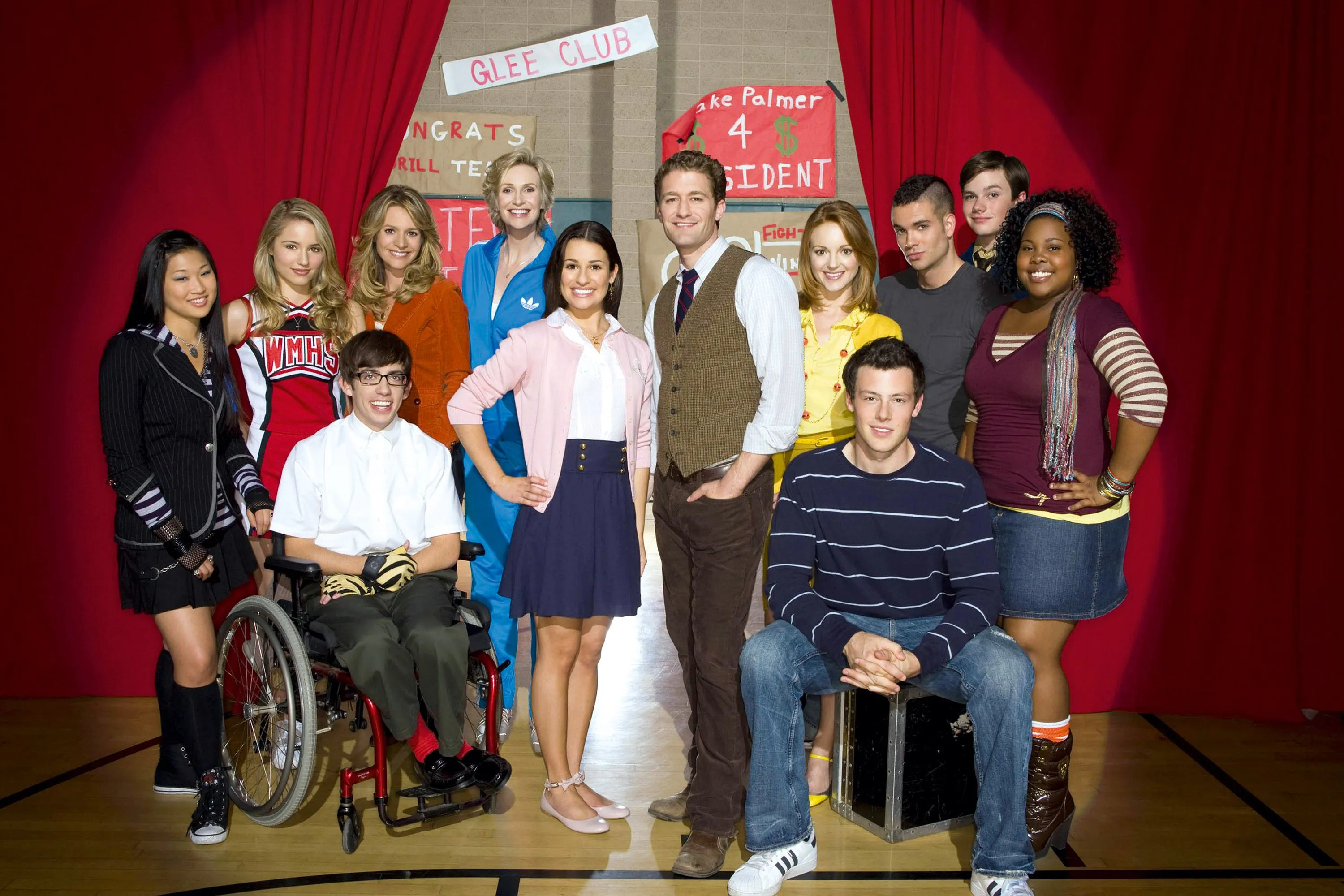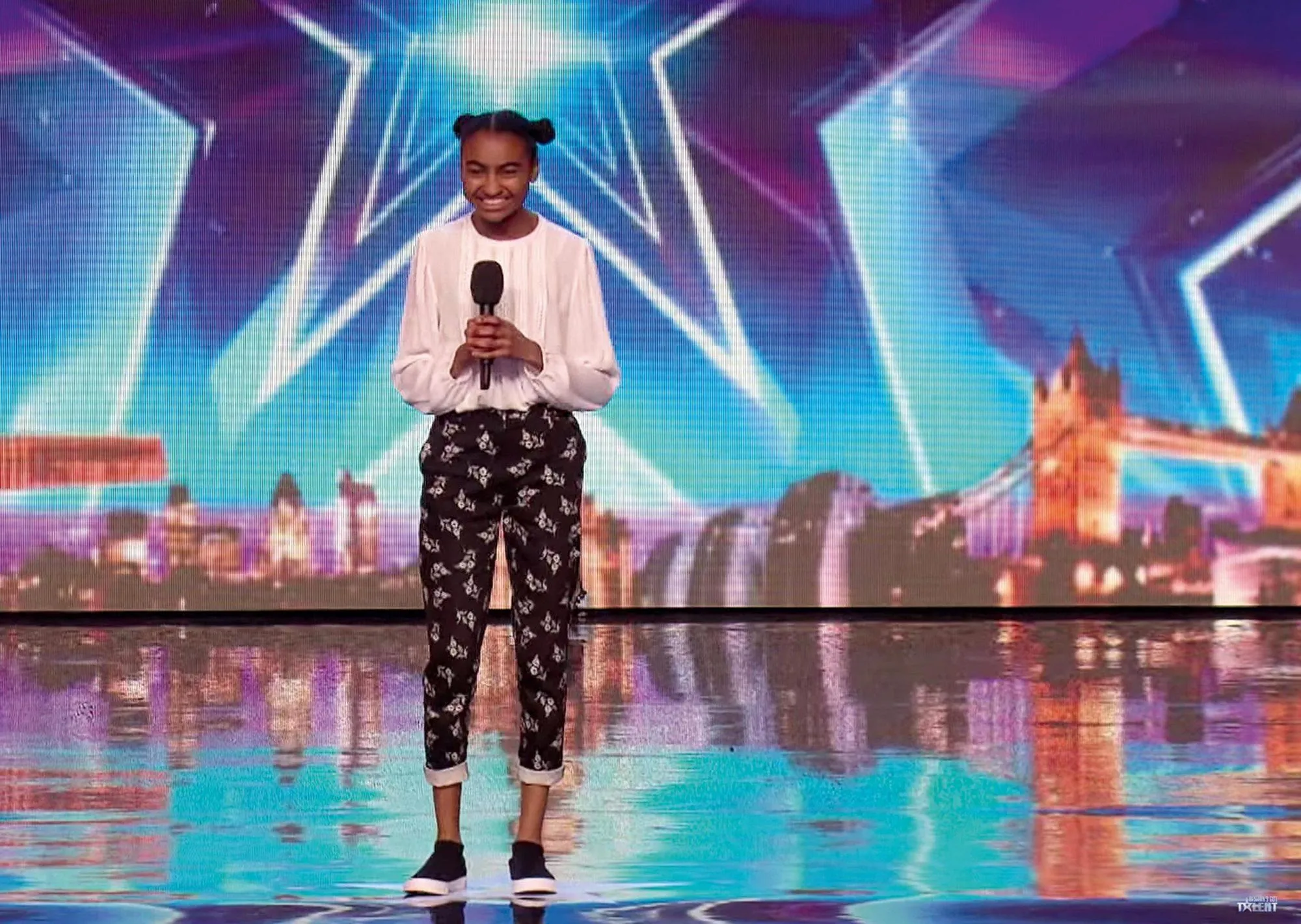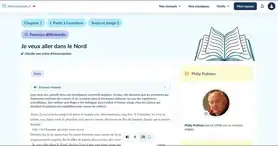Ressource affichée de l'autre côté.
Faites défiler pour voir la suite.
Faites défiler pour voir la suite.
1. In which country is the West End?
2. There are only ten professional theatres in the West End.
3. Broadway is in NYC.
2. There are only ten professional theatres in the West End.
3. Broadway is in NYC.
Ressource affichée de l'autre côté.
Faites défiler pour voir la suite.
Faites défiler pour voir la suite.
1
A fantastic glee club!
Ressource affichée de l'autre côté.
Faites défiler pour voir la suite.
Faites défiler pour voir la suite.
Activities


a
b
c
d
e
1. Look at the picture. Match each letter
with the correct definition.
Curtains
Posters
On stage
Wheelchair
Group of people
2. Match each talent to the corresponding quality.
3.
| speak loud and clear | |
| invent original stories | |
| have an ear for music | |
| run fast |
3.
Role playing
Choose one of the characters. It's time to go on stage.Tip
Hello. My name is… I am… I can...
Enregistreur audio
Ressource affichée de l'autre côté.
Faites défiler pour voir la suite.
Faites défiler pour voir la suite.
Ressource affichée de l'autre côté.
Faites défiler pour voir la suite.
Faites défiler pour voir la suite.
2
The show is on!
Ressource affichée de l'autre côté.
Faites défiler pour voir la suite.
Faites défiler pour voir la suite.
Activities


Britain's Got Talent, April 2016.
1. Look at the the picture and fill in the table.
| Who? | Where? |
|
|
|
2. Watch the and choose the correct answer.
a) The girl's name is
b) She is
c) She is at the audition with
d) She can
3. Link the reactions / actions to the correct people.
Applaud /əˈplɔːd/: clap hands.
| The judges | The audience | The two presenters |
4. What is your reaction to the video?
Tip
I love / like / hate it because...
Ressource affichée de l'autre côté.
Faites défiler pour voir la suite.
Faites défiler pour voir la suite.
Ressource affichée de l'autre côté.
Faites défiler pour voir la suite.
Faites défiler pour voir la suite.
3
Let's join in!
Ressource affichée de l'autre côté.
Faites défiler pour voir la suite.
Faites défiler pour voir la suite.
Activities
1. Look at . Complete the sentences and present the document.
a) This document is.
b) It is about.
c) The audition is on at .
2. Listen to the recording. Fill in the chart with the names of the pupils and their talents.
3. What's the problem at the end of the audio? Select the correct answer.
Eileen can't for the school musical.
4. Listen again to the audio. Match the correct time to each clock.


5.
a) This document is
b) It is about
c) The audition is on
2. Listen to the recording. Fill in the chart with the names of the pupils and their talents.
Let's join in!
| Names | Can | Can't |
|
|
|
|
|
|
|
|
3. What's the problem at the end of the audio? Select the correct answer.
Eileen can't for the school musical.
4. Listen again to the audio. Match the correct time to each clock.


| It is 3 o'clock. | It is 25 past 1. | It is 8 a.m. | It is a quarter past three. |
5.
Group work
Write a riddle about a club (date, time).Tip
It is on Wednesday at quarter past three. Is it the netball club?
Ressource affichée de l'autre côté.
Faites défiler pour voir la suite.
Faites défiler pour voir la suite.
La prononciation de can et can't
Listen
Listen: I can sing... Can you? Yes, I can. But I can't cook.
Réfléchis : Repère can lorsqu'il est accentué. Que remarques-tu ?
Repeat
Répète : I can swim. Can you act? No, I really can't...
Ressource affichée de l'autre côté.
Faites défiler pour voir la suite.
Faites défiler pour voir la suite.
L'expression de la capacité
Observe : He can dance. I can't act. Can you play the saxophone?
Réfléchis : Repère can et les autres verbes. Les verbes sont-ils conjugués ou à la base verbale?
À la forme négative, on ajoute
Conclus : Pour exprimer une capacité / incapacité, on utilise
Ressource affichée de l'autre côté.
Faites défiler pour voir la suite.
Faites défiler pour voir la suite.
Mission 2
1. The objective of this mission is...
2. Your mission is...
3. Choose your level:
2. Your mission is...
3. Choose your level:
Une erreur sur la page ? Une idée à proposer ?
Nos manuels sont collaboratifs, n'hésitez pas à nous en faire part.
j'ai une idée !
Oups, une coquille

